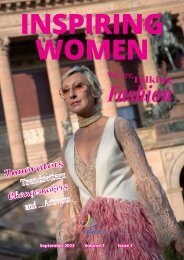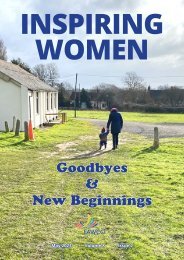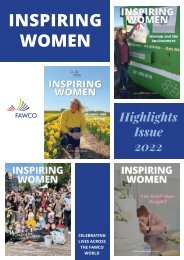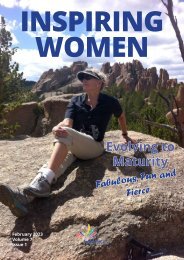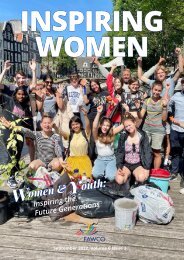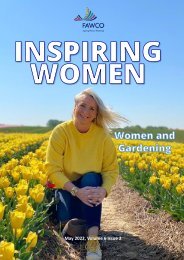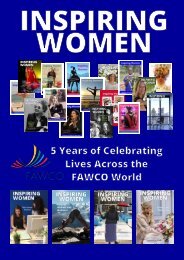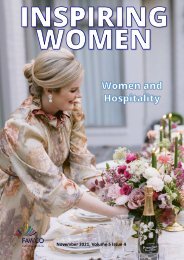Inspiring Women SUMMER 2020
You also want an ePaper? Increase the reach of your titles
YUMPU automatically turns print PDFs into web optimized ePapers that Google loves.
new school year will be a universal issue and will be managed at the micro level as schools adjust<br />
their curriculums to meet this new reality.<br />
That being said, I hope schools are truly focusing on the most critical aspects of curriculum and<br />
learning during this time. We need to ask ourselves, “In the big picture, how detrimental will it truly<br />
be if the average student misses four months of new curriculum in a roughly 117-month K - 12<br />
school career?” The best models of education I have seen during the quarantine have prioritized<br />
reality, enrichment, reinforcement, flexibility and feedback. On the contrary, schools that have<br />
tried to maintain operations as usual (prioritizing new learning, testing and traditional grading) and<br />
have attempted to stick a square peg in a VERY round hole have created untold (and some told!)<br />
stressors on all stakeholders, regardless of their expertise level in managing full-time remote<br />
learning. As I heard or read in passing (sorry that I am unable to remember the source), a high<br />
school senior noted that it’s not the last three months of her K -12 journey that will make or break<br />
her academically and personally. She explained that it was the preceding 12 + school years that<br />
have truly laid the groundwork for her future successes. Words of wisdom from an 18-year-old, a<br />
reality check and a lesson in perspective for the rest of us.<br />
If history tells us anything (think World War II and Hurricane Katrina), it’s that we are resilient as a<br />
world society. If the present situation tells us anything, it’s that schools are often the lynchpin in the<br />
community structures they serve. From providing meals to safe spaces to counseling to learning,<br />
schools are both physical structures and vibrant, living, breathing communities where relationships<br />
and bridges are built and social, emotional and academic skills are learned and nurtured. School<br />
staff have met this quarantine challenge head on and have reacted with humor, perseverance,<br />
sweat, tears and creativity. I have never been more impressed by my profession and I am proud,<br />
now more than ever, to call myself a teacher.<br />
All of that being said, it is one thing to read an excerpt/opinion from a teacher not currently on the<br />
frontlines, but another experience entirely to peek into the world of a current teacher and her<br />
student. I am honored and humbled to introduce you to my daughter, Laura McKelvey, as she<br />
shares her thoughts from the field.<br />
As I settle into the kitchen/office in my<br />
studio apartment to start the day, I<br />
remind myself of my new, previously<br />
unimaginable reality: I teach from home.<br />
Let me start by saying I’m glad to be able<br />
to stay home to help protect myself, my<br />
community and my students. I have an<br />
“essential” job that I can still conduct<br />
during the COVID-19 pandemic, so I get<br />
a paycheck and stay out of danger at<br />
the same time. This is an incredible<br />
privilege. Also, I hate it.<br />
I am a 6th year chemistry teacher at<br />
Johnson College Prep, in Chicago’s south<br />
side Englewood neighborhood. I’m also the head of the science department, an advisor<br />
(counselor/homeroom teacher) to 24 sophomore girls, and the varsity baseball coach (our<br />
canceled season is still a tough pill to swallow). Teaching during a pandemic has required fast<br />
acquisition of skills surrounding education tech, constant contacting of student families, and a reimagining<br />
of the exciting and far-reaching plans I had for my sophomore chemists this year.<br />
15







